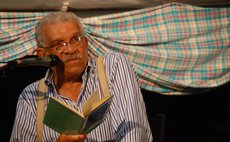Wisdom and frivolity
We are made for wisdom. However, many people are more prone to embrace frivolity. The search for wisdom is far from their minds. This is so not only for some illiterate and semi-literates but for some educated people as well. This is one of the fundamental problems of human life.
Some years ago, the Heavyweight Boxing Champion of the World, Muhammed Ali, was invited by Harvard University, one of the most prestigious universities in the U.S.A., to deliver the feature address at the Commencement Exercises. Muhammed Ali was, of course, well known for his clowning displayed on television. He said to the students: "People think that what they see on television is me. That is not me. People want to see and hear foolishness!"
A depth of insecurity is a favourite companion of most of us as we journey through life. This manifests itself in many ways. It often shows itself in the tendency towards self-promotion and self-affirmation even at the expense of others.
I can remember well how some years ago, when I was already a priest, I stood watching a game of cricket at the Botanical Gardens with a friend. A young man came up to me and asked me to display my entrance ticket. I took no offence. I showed my ticket. I understood him very well. It was a way of exercising his new-found authority. As we say, he was merely "cutting style" on me. We find the same human element expressed in many politicians and others in authority. Many of them come from very humble families. Their education is sometimes very limited. Becoming a politician or a person with power is an entrance into a new world of prestige which makes them feel that they are somebody. Now they can face the world!
We, human beings, have a strong propensity to use people and things for what they are not meant to be. Some enter into a marriage of convenience, not for love. Others use politics as a power game, not as a means of dedicated service. Still others seek education merely as a means to climb the social ladder, and not as a means of growing in wisdom.
Recently, a gentleman was convicted for match-fixing football games. He did that for between eighty and a hundred games. In an interview with a reporter, he was asked, "Do you regret what you have done? Do you have any remorse?" After a long pause for reflection, he replied, "I regard myself as a businessman." He was involved in a business undertaking. Conscience did not matter.
When we hear of the huge drug busts in our country and we take stock that one of the most driving businesses in our country is the narcotic drugs business, when we hear that a man taken into custody by the Police is found dead in his cell, we all pretend to be in a state of alarm, as if we never dreamt that this was the kind of country in which we live.
When we hear of one man brutally attacking a fellow-man, endeavoring to slash him and drive out the very breath of life from his being, we pretend to be appalled as if we are alien to such atrocities. We lament such brutality and hypocritically run for cover.
The truth is that incidents such as these tell us much about ourselves. They reveal to us who we really are. We are all in some way creators of the mess which is all around us. We all have to take full responsibility.
Unbridled greed and uncontrolled anger are the names of the game. The determination to accumulate things and to move on at all costs, the materialistic syndrome that we display in so many different ways, the rage in the depth of our hearts merely come to a climax in some huge, visible, catastrophic event that disturbs our silence.
The country in which we live is very sick. It is in dire need of healing far beyond the provision of our country for the ordinary diseases for which we have trained personnel. The situation is very crucial. And we see no hope of a way out. We cannot find a solution because we are all part of the problem.
The level of hate, of character assassination and human degradation is very high in this country. It continues unabated. Nothing will stop it. Its agents will not be denied. Constant confrontation is the order of the day. In fact, people seem to relish it. It appears in all corners, even in places where you would least expect to find it.
Often, people betray a sense of joy when they discover that their opponent has scarecrows in his closet. They harp on that. They will not let go. Yet, not all the vile incriminations levelled at their opponent can hide the sordid elements that seek refuge in their own wardrobe. This country will make progress only when we learn to value the gift of others and present ourselves in every way as builders and not destroyers.




